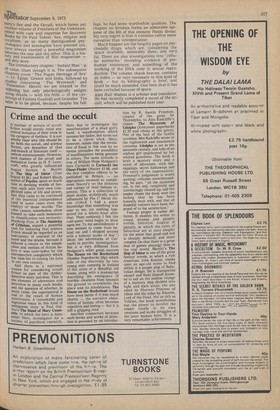Crime and the occult
A number of writers of occult fiction would sternly resist any critical inclusion of their work in the category of thrillers. It is not Wholly clear why this should be so: both the occult, and science fiction, are branches of that sub-branch of literature itself — serious entertainment. However, such masters of the occult and fantastical forms as H. P. Lovecraft, who greatly influenced August Derleth. A. Merritt in The Ship of Ishtar (Tom Stacey £1.95) and Robert Bloch, author of Psycho, spent so much time in devising •worlds of fantasy, each with their own comPlicated rules of life and power, that they came to be convinced of the essential independence (and in some cases even the reality) of, those worlds. The critic cannot, nonetheless, allow himself to take such resistance to classification too seriously: Northrop Frye, in The Anatomy Of criticism, argued a powerful case for believing that science fiction should be regarded as an instrument of renewal of the novel and the drama, because it induced a return to the simplicities and verities of fiction before it was over-laden by the introspective complexity which has bade fair to ruining the form in our own century. And there is a narrower reason for considering occult fiction as part of the thrillerdetective story universe. That is the element of adventure and detection in many such books, and the question of whether, in many cases, the supernatural is real or the result of human contrivance. A remarkable and ingenious essay in this kind of ambiguous story is Paul Gallico's The Hand of Mary Constable, in which the hero is Alexander Hero, investigator for a
...._society of psychical research.
Hero has to investigate the manifestation of a dead girl's hand, a manifestation which unmans her father, but turns out to be a clever trick. Hero, however, insists that the revelation of fraud in this case by no means precludes the possibility of manifestations being genuine in others. The same attitude is true of William Hope Hodgson's hero Carnacki in Carnacki the Ghost-Finder (Stacey £1.80, and the first complete edition to be published in Britain — an appropriate moment to compliment Stacey's on the richness and variety of their fantasy reprints). This is a collection of short stories, stylistically much influenced by Poe (" About eleven o'clock I had a queer knowledge that something was near to me, yet nothing happened for a whole hour after that. Then suddenly I felt the cold-queer wind begin to blow upon me. To my astonishment it now seemed to come from behind me and 1 shipped around with a hideous quake of fear.") about the adventures of Carnacki in psychic investigation. But it is very different from Hodgson's other great success The House on the Borderland (Hodder Paperbacks 35p) which tells of the discovery by two young men camping in Ireland of the ruins of a dreadful old house, along with a manuscript describing the emergence of horrible creatures from beneath the ground to overwhelm the place and its inhabitants. The House on the Borderland would have been better if it was much shorter — the narrative elaboration of fantasy often becomes repetitive and boring — but it is still a gripping read.
Another connection between such books and works of detection is provided by an introduc
tion by R. Austin Freeman, creator of the great Dr Thorndyke, to Ann Radcliffe's classic The Mysteries of Udolpho (Everyman paperbacks £1,25 and cheap at the price). One of the best of the Gothic novelists, Mrs Radcliffe wrote in the eighteenth and nineteenth centuries. Udolpho is set in the sixteenth century, and tells of an orphan girl imprisoned by her wicked guardians. The book is both a mystery story and a novel of adventure, with kidnappings, secret hideaways and the entry of the supernatural. Freeman's judgement is worth quoting: criticism notwithstanding, he says, "all the mysteries are, in the end, completely and convincingly cleared up, and the reader closes the book with the feeling that he has been honestly dealt with, and that all doubtful matters have been disposed of to his satisfaction."
Fantasy proper is rather different. It enables the writer to create strange and ghastly worlds, historical, magical or ghostly, in which the rules of behaviour are at once simpler (in the sense that good and evil is sharply defined) and more complex (in that there is a great deal of games playing) than in the real world. Merritt's The Ship of Ishtar is one of the great fantasy novels, in which a rich American, John Kenton, cracks open an age-old stone to find within it a people ship of Babylonian design. He is transported aboard and finds himself doomed to sail on the endless voyage of a mystery ship divided into light and dark areas, the one ruled by Sharane Princess of Ishtar and the other by Klaneth, Lord of the Dead. Not as rich as Tolkien, the book nonetheless has the power to involve the reader totally in its own creations and in, the struggles of the poor human hero. It is a very remarkable achievement.


































 Previous page
Previous page